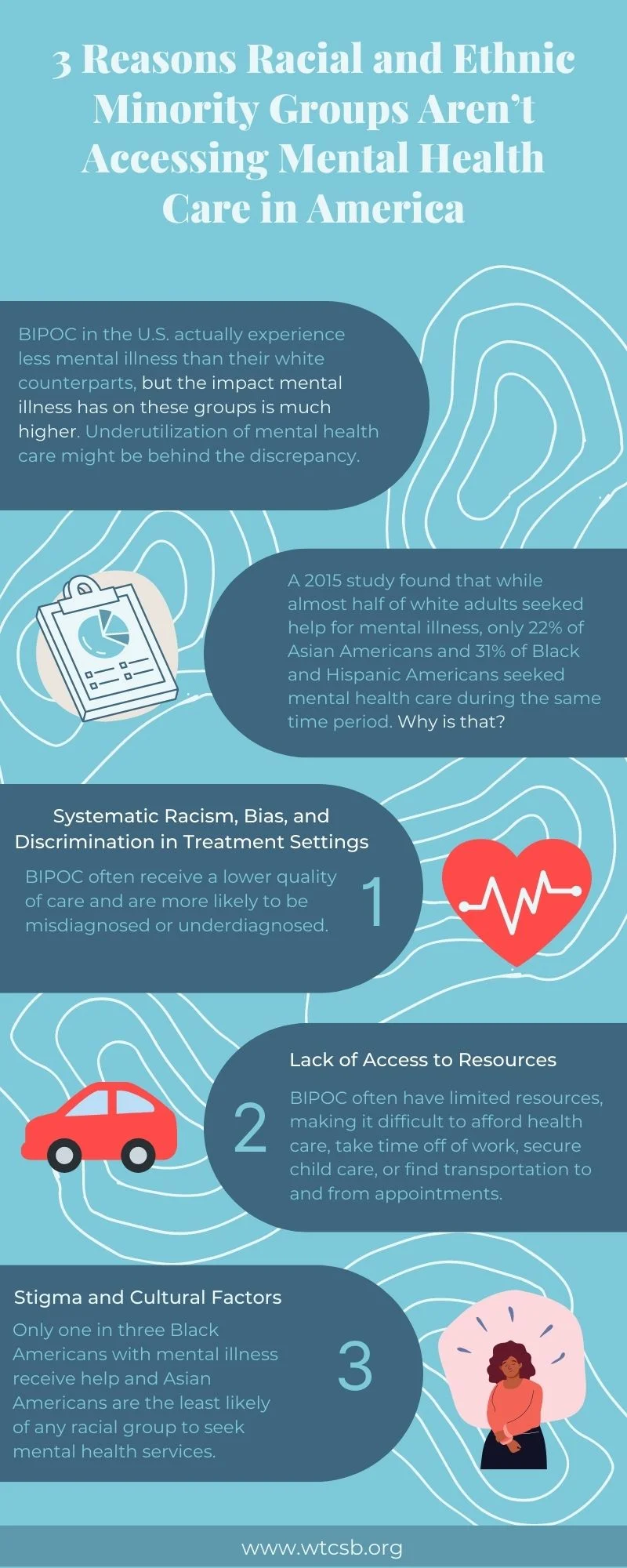There are many barriers someone seeking help for mental illness might face in America, but these barriers are often especially difficult for racial and ethnic minorities. Even though the rate of mental illness in Black, Indigenous, and people of color (BIPOC) in the U.S. is typically lower than the rate in their white counterparts, the impact of mental illness on minority groups tends to be much higher. For example, rates of depression in Black and Hispanic Americans are lower than rates of depression in whites, but depression in these groups is likely to be more persistent.
One contributing factor is likely the underutilization of mental health care services by BIPOC. A 2015 study found that while almost half of white adults seeked help for mental illness, only 22% of Asian Americans and 31% of Black and Hispanic Americans seeked mental health care during the same time period. Why are minority racial and ethnic groups accessing mental health care less? What are the unique struggles that these communities face regarding mental illness in the United States?
Why Minority Groups Are Not Accessing Health Care
Some barriers to access to mental health care for racial and ethnic minority groups include:
Systematic Racism, Bias, and Discrimination in Treatment Settings
In the United States, racism is systematic – meaning that it is deeply ingrained in every aspect of our society, and this includes the health care system. Racism isn’t always explicit or obvious. Individuals might not even realize they are contributing to racism or practicing discrimination or bias, and health care professionals are not impervious to it. As a result, BIPOC often receive a lower quality of care and are more likely to be misdiagnosed or underdiagnosed.
Lack of Access to Resources
Members of minority racial groups often have limited resources, making it difficult to afford health care, take time off of work, secure child care, or find transportation to and from appointments. For example, having access to a vehicle is important in rural areas that don’t have public transportation – and households headed by people of color are less likely than white households to have access to a vehicle, and Black-headed households are the least likely to have access.
Stigma and Cultural Factors
In some communities, there is a stigma against having a mental illness or seeking help for it. According to the American Psychiatric Association, only one in three Black Americans with mental illness receive help and Asian Americans are the least likely of any racial group to seek mental health services. Culture can also affect what types of help someone seeks, what types of coping styles and social supports they may have, and the meanings they apply to their mental illness. The culture of the practitioner and the service setting can also affect how they view and treat the patient. So, culture is very important when it comes to how mental illness is viewed and treated.
A Community of Hope
As a public, community mental health agency, we are dedicated to being accessible to all. We urge all the people of Franklin, Suffolk, and the counties of Isle of Wight and Southampton to reach out to us in their time of need. Western Tidewater CSB is your local single point-of-access for mental health services, developmental disabilities support, and substance abuse services, but we’re more than that – we’re a community of hope and caring.
Need some help? Make an appointment online for same-day access or call our 24/7 emergency services line at 757-925-2484.
Share the Infographic! Click to get the embed code
<a href=”https://www.wtcsb.org/3-reasons-racial-and-ethnic-minority-groups-arent-accessing-mental-health-care-in-america/“ target=”_blank”><img src=”https://www.wtcsb.org/wp-content/uploads/2022/07/WTCSB-3-Reasons-Racial-and-Ethnic-Minority-Groups-Arent-Accessing-Mental-Health-Care-in-America.jpg” /></a>







